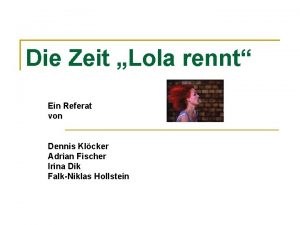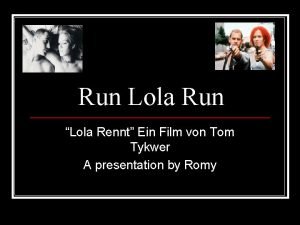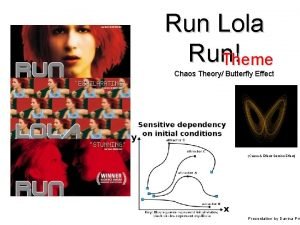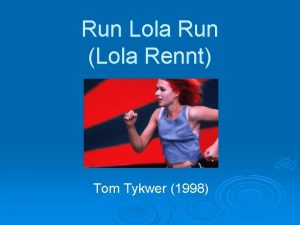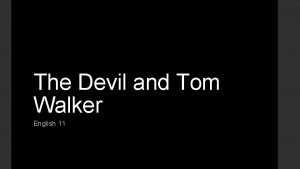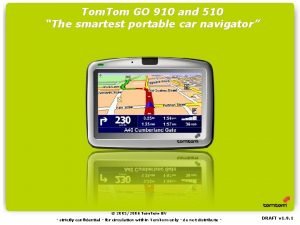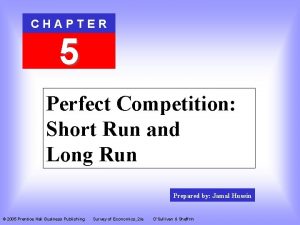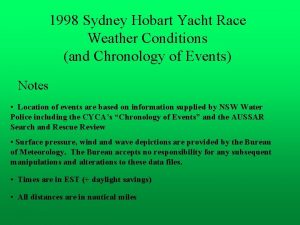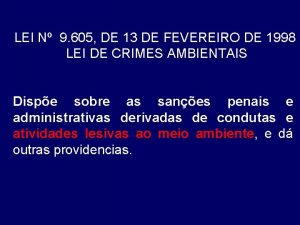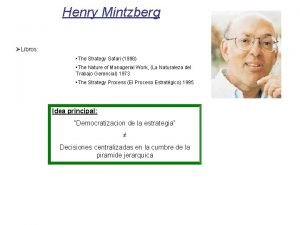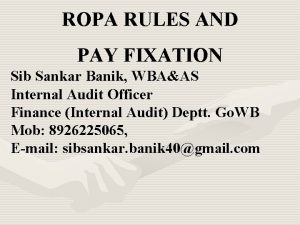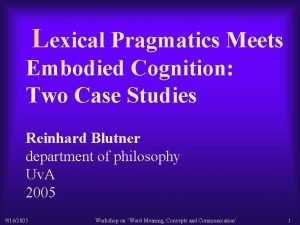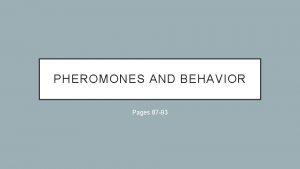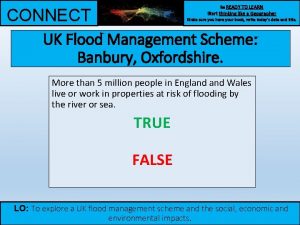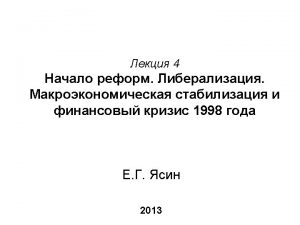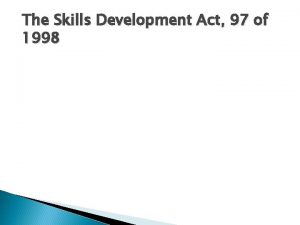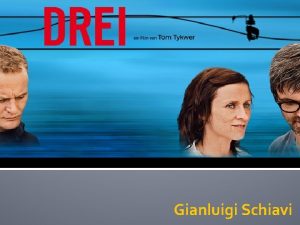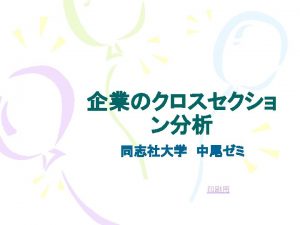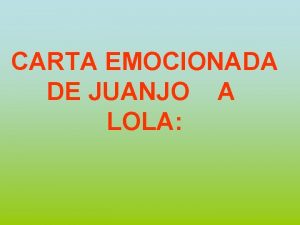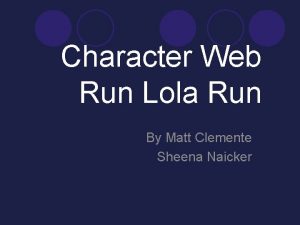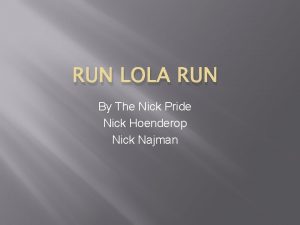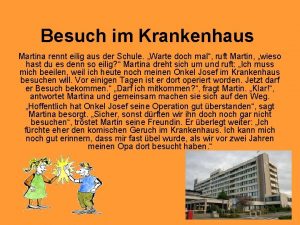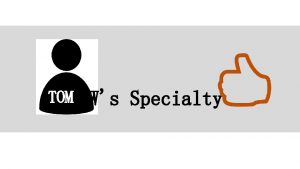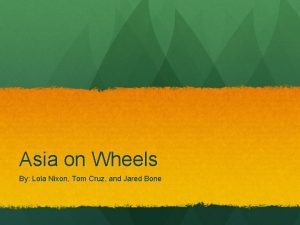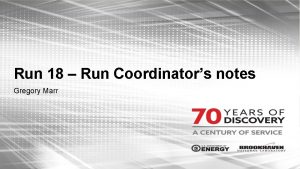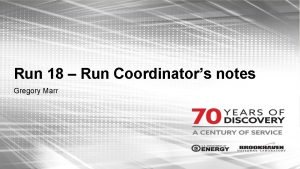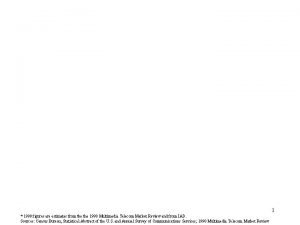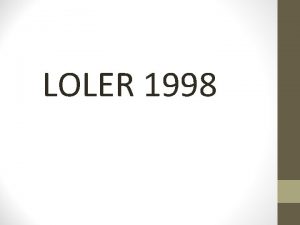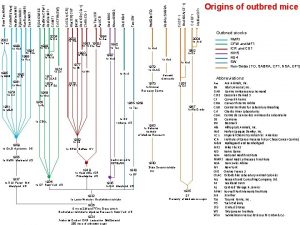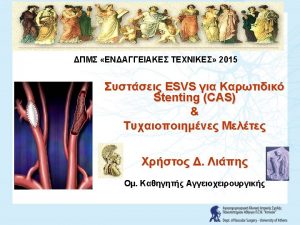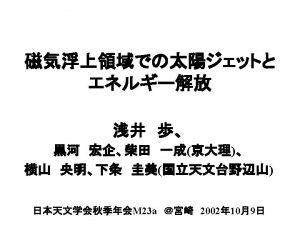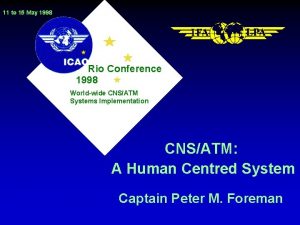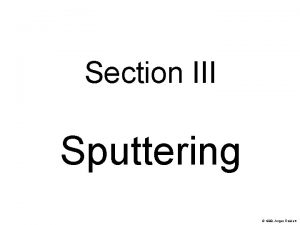Run Lola Run Lola Rennt Tom Tykwer 1998





























- Slides: 29

Run Lola Run (Lola Rennt) Tom Tykwer (1998)

Basic Plot The film begins with Lola receiving a phone call from her boyfriend Mani. He was supposed to bring 100, 000 marks from a diamond buyer to his boss. When Lola fails to pick him up due to her scooter being stolen that morning, he had to take the subway. When he sees some ticket controllers on the subway he gets off of the train, accidentally leaving the bag with the money. The bag is picked up by a homeless man. Mani now has to find 100, 000 mark within 20 minutes before his boss finds out, and plans to rob nearby supermarket. Lola urges him to wait and tells him she will organize the money. Lola slams down her phone and starts to think about who can possibly help her. The main part of the film is divided in three "runs". Each run starts from the same situation but develops differently and has a different outcome. Each run contains various flashforward sequences, showing how the lives of the people that Lola bumps into develop after the encounter. In each run, those people are affected in different ways.

Main Characters Lola - Franka Potente Mani - Moritz Bleibtreu Lola’s dad - Herbert Knaup Security guard - Armin Rohde

Setting Ø Berlin, Germany, late 1990 s. Ø Setting is established visually through a helicopter shot which clearly establishes that the film is set in a modern city. Natives to Germany would recognise the landmarks of Berlin, although the exact location of the city is not super important as any western city would suffice as a setting for gangster type action.

Opening Sequence Ø The opening of a film is often the most critical part of the film. This is where the audience expectations are set up. What narrative possibilities are established in the opening of RLR? What could be about to happen? Why do you think this? Ø Consider the following: Titles Music Camera movement Visual style Dialogue

Opening Ø Titles: Titles tend to spiral in when which may be some indication of the cyclic nature of the film. Spiralling may suggest that we are always returned to the beginning. We are also presented with mug shot style portraits of the characters which may be an indication the film involves some sort of a crime. Ø Music: The music in the opening, much like the music throughout the film has a relentless, driving beat. This complements the fast pace of the film. It may be suggesting that the film is going to be about some sort of race or event with a frantic pace.

Opening cont’ Ø Camera: The opening camera franticly weaves through an out of focus crowd pointing out specific characters before focusing on the security guard who gives us a line of philosophy relevant to the plot. We get an fast, exciting crane shot above Berlin that speedily approaches Lola’s apartment and zooms through to focus on the phone. This may give the audience the impression this will be a fast paced film. Ø Visual Style: Visual style is very important in this film. In the short span of time that is the opening sequence the audience is exposed to animation, stills, fast forwards, and very obvious fast paced editing. This may indicate to the audience they should expect a non-traditional film.

Opening cont’ Ø Dialogue: The first bit of dialogue we hear is a philosophical VO about man being a curious creature. Following this we hear a line of dialogue from the guard with the soccer ball suggesting some sort of analogy about life. “The ball is round, the game lasts 90 minutes, anything else is pure theory”. This could translate as “you are born and after several decades you die, what happens in-between is unpredictable”. This may be suggesting the film is about unpredictability in situations. The conversation that takes place between Mani and Lola clearly establishes what the film will be about. Mani has managed to lose 100, 000 marks which he needs to give to his gangster boss at in 20 minutes at 12 noon. The film is now clearly going to be about a race against time.

Opening cont’ Ø Summary: Although by the end of the opening sequence the dialogue between Mani and Lola clearly outlines the plot line elements such as the philosophical VO and statement from the guard suggest it may be more complex than that. We are presented with “game like” imagery of a character smashing titles with the sound of breaking glass and lots of different production effects. It is clear from the onset that this is not going to be a traditional crime suspense thriller.

Production Elements Ø Discuss how each of the following production elements enhance the audience’s engagement with a character in Run Lola Run. Camera movement Sound (music, dialogue, VO, sfx) Editing

Lola Clearly Lola is the hero of the film. She is portrayed as some sort of modern day female super heroine. Although she seems to possess some super human traits such as breaking glass with her voice and bringing people back to life, it’s her positive attitude and determination that saves the day. The director clearly wants us to align with Lola and her plight.

Camera Movement Ø Whenever Lola is running she is filmed predominantly with tracking shots. Tracking shots give the audience the feeling that they are right there alongside Lola. Almost like you are running with her. This type of camera movement helps he audience engage in Lola’s journey more so than dolly shots or other type of movement. However the fast editing pace of RLR cuts in lots of different angles/shots to keep the visual style interesting and fast paced.

Sound (music, VO, dialogue, sfx) Ø Music: The use of the techno sound track whenever Lola is running reinforces to the audience the race against time and the tight timeline Lola has. We as an audience understand time is running out and want her to succeed in her mission. Ø Dialogue: The dialogue that takes place between Mani and Lola on the phone clearly establishes that Lola is always bailing Mani out of situations he stupidly gets into. As an audience we align with Lola as Mani comes across as demanding and selfish.

Sound (cont’) Ø Voice Over: The use of VO whilst Lola is running demonstrates to the audience that she has no grand master plan for this mission. She is relying on pure chance and her positive attitude to find a solution. She never gives up, just keeps running and “waiting” for an idea, or situation to occur. This helps the audience engage with her and feel a sense hope when she stumbles on a potential solution. We want her optimistic attitude to succeed.

Editing Ø The editing in RLR is fast paced and significant in many ways. The director has used numerous editing techniques to help the audience engage with the characters. When Lola is trying to work out who to approach for the money the fast paced flashing in of different faces, combined with the rotating camera highlights her manic train of thought. The audience can see (and hear) her thought process and understand where she is going which helps them engage with the story, and character.

Editing cont’ Ø The 3 way screen split at the end of ‘run one’ is an effective way to highlight the important factors in the situation (Lola, Mani, time) and engage the audience at this critical point – 12 noon. Ø There are many different edits and cuts while Lola is running in order to show far she has gone in a shorter amount of time than reality. There are times when Lola is running and the camera is in front of her then it quickly cuts to behind her as if she has just ran through the camera. Other times it cuts from the front to the side to give a better picture of where she is actually running. The variety in the editing helps keep the audience engaged with Lola’s journey.

Audience understanding With reference to Run Lola Run provide one example for each of the following production elements and explain how contribute to the audience’s understanding of the narrative. Ø Lighting Ø Sound (music, dialogue, sfx, VO) Ø Camera work/Film technique

Lighting Ø Bed scenes: The bedroom scenes between each run is bathed in a saturated red. Red is symbolic of love, passion & anger. In these scenes they are questioning their relationship. The use of the red wash helps the audience understand the emotions displayed. Ø Video Scenes: . The scene in the bank is lit ( and coupled with the medium of video) to appear harsh and cold, much like the relationship between Lola’s father and his lover. As this is so visually different to the rest of the film, which is lit naturalistically, the audience is forced to pay attention to the discussion between the lovers and understand the impact on Lola’s plight.

Sound (music, dialogue, VO, sfx) Ø Dialogue: The conversation which takes place on the telephone at the beginning of the film is integral to the audience’s understanding of the narrative. It clearly establishes the problem, how it was created and what needs to be done to resolve it. This is particularly important in what is essentially a 20 min film (3 times). We don’t have time to waste and need to engage the audience immediately. Ø SFX: After the first run, when Lola is shot, Mani’s gun makes an unexpected noise when it hits the ground. Almost like the sound of failure. This may have ben used to highlight to the audience that this is not an acceptable outcome. NB: It may just be the sound slowed down but the director has left it in for a reason.

Camera work / Film technique Ø Camera work: After Mani and Lola escape from the supermarket and are surrounded by the police the camera does a full 360 degree rotation about them. This helps the audience to understand that they are surrounded and have no escape route, or choice but to give up. Ø Film stock: Although the majority of the film is shot on standard 35 mm film the scenes that do not directly involve Lola or Mani are shot on video. The striking difference in visuals forces the audience to pay attention to the content of the conversations in these scenes and how they impact on Lola’s journey and it’s outcome.

Cause and Effect A narrative generally begins with a situation, then a series of changes occur according to a pattern of cause and effect. With reference to Run Lola Run, discuss two examples to show cause and effect contributes to the way the narrative has been set out or organised.

Cause and Effect Lola goes to shops to get cigarettes, leaves moped outside and it gets stolen (Cause) Ø Lola is not there to pick up Mani at the designated point. (Effect) Ø Mani takes the train but panics when the guards get onboard (Cause) Ø Mani leaves the money on the train (Effect) Ø Tramp takes the money (Cause) Ø Mani has to find 100, 000 marks within 20 minutes when he is meant to meet his boss (Effect) Ø

Sequence Question Ø Select a sequence from Run Lola Run and discuss with examples how any four of the following elements contributed to the effectiveness of that sequence. Camera/Film techniques. • Sound (music, dialogue, sfx, voice over). • Editing • Developing storyline. • Character development • Creating suspense •

Supermarket Escape sequence Ø Camera/Film techniques: As Lola and Mani exit the supermarket the camera is following them from a distance which leaves the audience wondering if they are being pursued. This is effective in adding to the suspense. Will they get away? Once they are stopped by the police blockades at either end of the street the camera does a full 360 degree rotation around them demonstrating that there is no escape route; they are surrounded by walls or police. This is effective in communicating to the audience their predicament and questioning how they will escape.

Supermarket Escape sequence Ø Sound (music, dialogue, sfx, voice over): As Mani and Lola run out of the supermarket the first thing the audience notices is the distinct change in the style and pace of the music. We move from the fast paced, driving techno to a laid back, relaxing jazz track, “What a a difference a day makes”. This lulls the audience into a sense of security. They are led to believe that the characters have escaped without consequence and will complete their mission however the sound of police sirens soon permeate through the song and we are reminded that their illegal activities have consequences. The drastic change in the music gives the audience a break and a chance to relax for a moment. This is effective method to manipulate the audience’s emotions.

Supermarket Escape sequence Ø Editing: Some of the most effective editing in this sequence is once they are surrounded by police. When Mani throws the bag into the air everything goes into slow motion. The slow motion is an effective mechanism to highlight the tragedy of this ‘run’. We cut from the ascending bag, to the police officer firing his gun accidentally while watching the bag, to a FS of Lola being shot in the chest and falling to the ground. This is not an outcome the audience is expecting and the slow motion extends the tragedy of the situation; the heroine of the story has been killed, we assume, by a most un heroic character by accident about thirty minutes into the film! Most audiences are confused about where the story could go now.

Supermarket Escape sequence Ø Developing storyline: This is one of the pivotal points in the storyline. They achieve one of the key goals outlined in the opening: get 100, 000 marks in 20 minutes or Mani dies. This is short lived though as they lose the money (thrown to police) and Lola is killed (we assume). The whole point of the film is to explore choices and the notion of chance vs. fate. The audience is not expecting to be returned to the beginning so having the heroine killed, yet able to return to the starting point for another journey is an effective way of continuing the exploration of chance vs. fate.

Supermarket Escape sequence Ø Character development: At this point in the film the audience has very definite impressions of our two main characters. When they first exit the supermarket the production elements allude that they are successful and our impression of Lola and her ‘can do’ attitude is raised higher. When she is shot the audience is left feeling confused; the good person isn’t mean to die. In some ways her ability to cheat death and get to ‘start’ again makes the scene more effective as it develops her character’s determination and positive attitude even further.

Supermarket Escape sequence Ø Creating suspense: The creation of suspense is achieved through a number of production elements in this sequence. It is interesting that the director forces the audience to relax (through the contrast in music) as they leave the supermarket before launching them into what seems a hopeless situation for Lola and Mani as they are surrounded by police. The contrast adds to the intensity of the suspense making it more the sequence more effective. The use of the slow motion as they are surrounded also aids in creating suspense by prolonging the outcome of the situation. It seems to take forever for Lola to hit the ground after being shot leaving the audience with time to ponder where the narrative could possibly go now, which adds to the effectiveness of the sequence.
 Zeitraffung
Zeitraffung Lola rennt filmanalyse
Lola rennt filmanalyse Themes in run lola run
Themes in run lola run Run lola run editing techniques
Run lola run editing techniques Run lola run script
Run lola run script The devil and tom walker symbols
The devil and tom walker symbols Go 910
Go 910 Multirule plus
Multirule plus Perfect competition short run
Perfect competition short run Long run equilibrium under perfect competition
Long run equilibrium under perfect competition Short run vs long run economics
Short run vs long run economics 1300 hrs
1300 hrs Lei nº 9.605 de 12 de fevereiro de 1998
Lei nº 9.605 de 12 de fevereiro de 1998 Dpa 1998
Dpa 1998 Mintzberg 1998
Mintzberg 1998 Wba&as salary
Wba&as salary Memes word
Memes word Bbc bitesize data protection act
Bbc bitesize data protection act 1966-1998
1966-1998 1998-1982
1998-1982 Cutler friedmann and mccoy (1998)
Cutler friedmann and mccoy (1998) Hampel report
Hampel report Video game 1998
Video game 1998 Banbury floods 1998
Banbury floods 1998 Portaria svs/ms 27/1998
Portaria svs/ms 27/1998 1997-1998
1997-1998 1993 1994 1995 1996 1997 1998 1999 2000 2001 2002
1993 1994 1995 1996 1997 1998 1999 2000 2001 2002 Purpose of sda
Purpose of sda 1998 in roman numerals
1998 in roman numerals Rys 9 1998
Rys 9 1998
